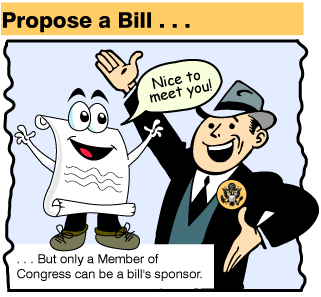Wednesday January 9, 2013 – Periods 2, 3, 6, 7
 Private bills and public bills are introduced in Congress. Private bills deal with individual people or places, often involving claims against the government. Public bills deal with general matters and apply to the entire nation, such as tax cuts, gun control, and civil rights. Congress can also pass resolutions to make policy. A simple resolution covers matters affecting only one house of Congress and is passed by that house alone. It does not have the force of law. A joint resolution is passed in the same form by both houses and must be signed by the president to become law. Concurrent resolutions cover matters in both houses, and do not become law.
Private bills and public bills are introduced in Congress. Private bills deal with individual people or places, often involving claims against the government. Public bills deal with general matters and apply to the entire nation, such as tax cuts, gun control, and civil rights. Congress can also pass resolutions to make policy. A simple resolution covers matters affecting only one house of Congress and is passed by that house alone. It does not have the force of law. A joint resolution is passed in the same form by both houses and must be signed by the president to become law. Concurrent resolutions cover matters in both houses, and do not become law.
Earmarks are a way that members of Congress can specify that some part of a funding bill will go toward a certain purpose. Bills sometimes have riders attached, which are provisions on subjects other than the one covered in the bill.
Filed under: class, Congress, government |

